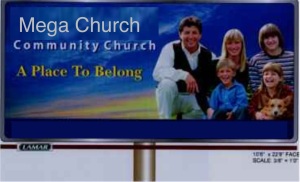You are currently browsing the tag archive for the ‘Will Boyd’ tag.
Tag Archive
Social Monday – Using Social Media to Introduce Your Church to Itself and the World
September 14, 2009 in social media, Technology | Tags: 3 story church, blogging, blogs, Facebook, social media, social media for churches, Twitter, Will Boyd | by Will Boyd | 5 comments
 I get a lot of questions about how churches can use social media. Almost 100% of the time, the person basically wants to be taught a new technique that will help them use a tool like Facebook to attract new people to their church. Generally, I bristle a bit at the idea that social media’s usefulness for churches is all about attraction. Thus, I tend to not give out many how-to’s. Instead, I try to focus on getting churches to re-engage with their story and help them use things like social media to tell that story. However, I have a simple idea that I want to share in hopes that some church will give it a try and let me know how it goes.
I get a lot of questions about how churches can use social media. Almost 100% of the time, the person basically wants to be taught a new technique that will help them use a tool like Facebook to attract new people to their church. Generally, I bristle a bit at the idea that social media’s usefulness for churches is all about attraction. Thus, I tend to not give out many how-to’s. Instead, I try to focus on getting churches to re-engage with their story and help them use things like social media to tell that story. However, I have a simple idea that I want to share in hopes that some church will give it a try and let me know how it goes.
If your church is like most churches, you probably have a significant number of people that barely use email and will most likely never use anything like Facebook. Does that mean that those folks have no role in social media for your church? I don’t think so. They will just need a little help. “Where will that help come from,” you ask? I’d be willing to bet that your church is also very likely to have a social-media-engaged population that is right under your nose. Maybe it is the youth group or some young adults? Whoever it is, I’m certain their are at least a few people in your congregation that are using things like Facebook. Your job, should you choose to accept it, is to get those folks together.
I’m certainly not suggesting that the youth group teach the elders how to blog or set up a Facebook profile. That will go nowhere quick. However, what if, on a couple of Sundays, a time was set up for story-sharing and faith-listening. What if the young people were given an assignment to ask some of the older folks in the congregation about meaningful moments in their faith life? Those youth or young adults would then be responsible for sharing what they learned on the church’s Facebook page or blog. The older folks could, in return, listen to the faith stories of the younger folks and provide their reflections of what they learned to someone who could post them to the social media space as well. With just a Sunday or two’s worth of work, enough stories could be gathered that the church could post one a week for a few months.
Sure, this idea is not completely fleshed out, but maybe that’s okay? What I like about it is that it encourages different generations to really listen and engage with each other’s faith stories. I also love the fact that, by sharing them on sites like Facebook or the church’s website, it invites the world to participate in that “faith listening”. To me there is no more powerful way to introduce your church to the world than through the stories of your faith. How much better is it when you can also more deeply introduce yourselves to each other?
Could your church do something like this? What ideas does this post give you about ways to engage multiple generations through social media? Am I way off?
 Will Boyd is owner of 3 Story Church, a church web and social media firm that is focused on helping churches tell their stories. He has worked with Sojourners Magazine, the Disciples of Christ Historical Society, Goddard College, the Disciples Divinity House at Vanderbilt, and others. Will also recently finished a bachelor of arts degree from Goddard College that focused on the role of new media and social technologies in the world of sustainable marketing. Will lives in Seattle with his wife, a Disciples pastor.
Will Boyd is owner of 3 Story Church, a church web and social media firm that is focused on helping churches tell their stories. He has worked with Sojourners Magazine, the Disciples of Christ Historical Society, Goddard College, the Disciples Divinity House at Vanderbilt, and others. Will also recently finished a bachelor of arts degree from Goddard College that focused on the role of new media and social technologies in the world of sustainable marketing. Will lives in Seattle with his wife, a Disciples pastor.
Social Monday – 3 Ideas for “Being Church” on Facebook
August 17, 2009 in Culture and Media, Disciples of Christ, social media, Technology | Tags: 2.0, church outreach, evangelism, Facebook, social media, social monday, social networking, Twitter, Will Boyd | by Will Boyd | 3 comments
 As many of you may know, I had the great privilege of presenting at the Church 2.0 resource group at the 2009 General Assembly of the Christian Church (Disciples of Christ). It was a great time, and I hope those that were able to attend got something out of it. I do realize however, that there were some folks that attended who left a bit disappointed. While I spent my time discussing how the changes happening in social media are changing the church, some people simply wanted to know how to use Facebook. Unfortunately, in a setting like the General Assembly resource groups where everyone has a different experience level and different needs, those types of how-to discussions are nearly impossible to have. On the other hand, the how-to’s of social media tools are certainly important.
As many of you may know, I had the great privilege of presenting at the Church 2.0 resource group at the 2009 General Assembly of the Christian Church (Disciples of Christ). It was a great time, and I hope those that were able to attend got something out of it. I do realize however, that there were some folks that attended who left a bit disappointed. While I spent my time discussing how the changes happening in social media are changing the church, some people simply wanted to know how to use Facebook. Unfortunately, in a setting like the General Assembly resource groups where everyone has a different experience level and different needs, those types of how-to discussions are nearly impossible to have. On the other hand, the how-to’s of social media tools are certainly important.
Just yesterday, my wife brought home a back issue of The Christian Century which had a great article that begins to bridge the gap between our discussion at the General Assembly of how social media is changing church and how churches can use tools like Facebook. In “The church on Facebook“, Lenora Rand does a great job at showing how, rather than being an advertising tool designed to draw new people into the church building, these social media tools are allowing churches to live their mission in new ways. I won’t recap Rand’s article here, though I do suggest reading it. What I will do is provide 3 simple ways (not techniques or strategies) for how churches might think about “being church” on social media tools like Facebook.
1. Evangelism
A church’s Facebook page can be a great evangelism tool. Quite simply, everything that happens at the church should also be posted on the church’s Facebook page. However, just like evangelism doesn’t end with the minister, Facebook evangelism doesn’t end with the church’s Facebook page.
 Every Facebook page, group, and event has a button that allows that information to be shared. Those members of your church who are already using Facebook already have lots of friends that aren’t members of your church. By simply getting church members to use that share button to share the events and happenings of the church with their friends, Facebook truly becomes social media. As I discussed in the Chruch 2.0 resource group at General Assembly, it is the sharing that makes these websites social. Having a Facebook page is good for a church. Having a Facebook page where the church members share the information and content with their friends is evangelism.
Every Facebook page, group, and event has a button that allows that information to be shared. Those members of your church who are already using Facebook already have lots of friends that aren’t members of your church. By simply getting church members to use that share button to share the events and happenings of the church with their friends, Facebook truly becomes social media. As I discussed in the Chruch 2.0 resource group at General Assembly, it is the sharing that makes these websites social. Having a Facebook page is good for a church. Having a Facebook page where the church members share the information and content with their friends is evangelism.
2. Outreach
In any communication, listening is usually way more important than speaking. I think the same thing can be said of church outreach. If we as churches want to be relevant, we need to become better listeners. Social media tools like Facebook can be great hearing aids for our churches. When your church begins to use Facebook, concentrate more on what you as a church can learn about people, both inside of and outside of your church, than on how to attract people to come to your church. Ask questions and listen to the answers. As Rand’s article illustrates, find out who your church can be praying for. You might be surprised how much more powerful it is to engage people in community rather than broadcast information AT them.
Of course, just like with evangelism, while this kind of outreach can be done through your church’s Facebook page, it is often best done through the members of your church who are already on Facebook. A church with a Facebook page can be engaging. A church whose members are actively engaging others is a church that is truly reaching out — whether on Facebook or not.
3. Worship
If you think that worship can only happen between 11:00 am and Noon in your church sanctuary, then Facebook and social media may not be roads your church is ready to go down. However, if you are willing to get creative, social media tools like Facebook can provide great opportunities for your church to “be church” in radically new ways.
What if your church held an online Bible study by creating a Facebook group? Church members could invite their friends to participate whenever it was convenient. Some folks might not ever walk into a church building simply because they are invited, but they might just be willing to stop by a Facebook group when they have a minute and check out what their friend has been telling them about.
Consider providing short devotionals on your church’s Facebook page. How cool would it be if different members of your church posted a short weekly or daily devotional to Facebook based on that upcoming Sunday’s lectionary text?
Be creative and try new things. You never know what might be the thing that will provide a space for worship to someone inside or outside of your church. After all, isn’t that what church is all about?
I completely understand the desire we all have to find a simple tool that will make the job of attracting people to our churches easier. However, social media is not that tool….and that really shouldn’t be our goal. The real work is not getting more bodies into our pews on Sunday morning. The real work is connecting with God and God’s children in real and meaningful ways, and that work of forming relationships with each other and with God is no different or easier than it has ever been. Social media tools like Facebook don’t do the work for us, but they do give us new spaces in which to do our work. They give us new spaces to “be church.”
 Will Boyd is owner of 3 Story Church, a church web and social media firm that is focused on helping churches tell their stories. He has worked with Sojourners Magazine, the Disciples of Christ Historical Society, Goddard College, the Disciples Divinity House at Vanderbilt, and others. Will also recently finished a bachelor of arts degree from Goddard College that focused on the role of new media and social technologies in the world of sustainable marketing. Will lives in Seattle with his wife, a Disciples pastor.
Will Boyd is owner of 3 Story Church, a church web and social media firm that is focused on helping churches tell their stories. He has worked with Sojourners Magazine, the Disciples of Christ Historical Society, Goddard College, the Disciples Divinity House at Vanderbilt, and others. Will also recently finished a bachelor of arts degree from Goddard College that focused on the role of new media and social technologies in the world of sustainable marketing. Will lives in Seattle with his wife, a Disciples pastor.
Social Monday: 3 Things Every Church Member Should Know About Social Media
March 23, 2009 in Culture and Media, Disciples of Christ, social media, Technology | Tags: church marketing, social media for churches, social media marketing, twitter for churches, Will Boyd | by Will Boyd | 12 comments
With all of the news coverage of churches using things like Twitter and Facebook of late, I’ve gotten the opportunity to talk to a lot of the members of my church about social media and the way our church is using it. What I’ve come to realize is that, for most people, their is a lot of misunderstanding about what social media really is. That is why I wanted to write this post. This post is not a how-to guide for churches that want to use social media. Nor is it meant to be an argument for why churches must or must not use a particular service, website, or strategy, though it may seem that way at times. What this post is meant to do is provide a basic background for what social media, at its core, is. I realize that it is not an exhaustive list, but I think it is a good start.
1. Social Media Is Not About The Technology
 To most people, the rate at which new technologies keep popping up and changing is staggering. It seems hard, if not impossible, to keep up with the latest gadget or social network. So, it’s understandable that when people start talking about how important a particular piece of technology is, some people become immediately skeptical. After all, in the world of technology, what is here today is often gone this afternoon. Knowing this, why should any church bother using something like Facebook when it might be out of style in 6 months?
To most people, the rate at which new technologies keep popping up and changing is staggering. It seems hard, if not impossible, to keep up with the latest gadget or social network. So, it’s understandable that when people start talking about how important a particular piece of technology is, some people become immediately skeptical. After all, in the world of technology, what is here today is often gone this afternoon. Knowing this, why should any church bother using something like Facebook when it might be out of style in 6 months?
That is a very good question. As someone who makes his living with these new social media tools, I am very aware of how fast they change. I am also aware, however, of how with each change, the one thing that makes these new tools important stays the same — relationships. Relationships are the life blood of social media. Whether you are talking about MySpace, Facebook, Twitter, etc., the one thing they have in common is that people use them to connect with each other.
I’ve heard people argue “how can these relationships be real if they are on the computer?” I realize that it is hard for a lot of us to get past the idea that what people do while they are online isn’t real life. For a lot of folks, “real life” only happens in person. Social media, however, is breaking down those distinctions between what is “real” and what is “virtual”. It is quite common for relationships that begin on a social media site like Twitter, to quickly become a weekly coffee date or a group that meets at a local restaurant once a month. Facebook is being used by people to keep up with friends from the past that they knew before there was an internet. Now, those people are able to watch their friends’ children grow up from across the country. To these people, the connections being made are anything but “virtual.” Whether or not you participate in social media, it is important to realize that people are using these social media tools to share their lives with each other, and that is very real.
For churches, being able to connect with people and form relationships is also their life blood. After all, church is nothing more than an offline social network. Churches connect us with God and with each other. The relationships that are formed in church, much like the relationships formed via social media, do not stop at the church door. They penetrate every aspect of our lives. Social media is not about the technology…it’s about the relationships. This is why the church is in such a good position to use social media. Churches understand how to form relationships. It’s just what they do.
2. Social Media Is Not About Church Marketing
 Imagine you’re driving along the highway and you see a giant billboard advertising a church. The billboard has a nice image of a smiling family and a warm friendly message inviting you to a Sunday morning service. From this billboard, what do you know about the church? Are you forming a relationship with the church by looking at the smiling family that may or may not even be members of that church? This is the difference between churches using social media and church marketing.
Imagine you’re driving along the highway and you see a giant billboard advertising a church. The billboard has a nice image of a smiling family and a warm friendly message inviting you to a Sunday morning service. From this billboard, what do you know about the church? Are you forming a relationship with the church by looking at the smiling family that may or may not even be members of that church? This is the difference between churches using social media and church marketing.
Marketing is about providing an image that invites the person seeing that image to tell themselves a positive story about the company/product/church. In other words, the point of that billboard you saw was to get you to say to yourself, “Those people look happy. I want to be happy. I’ll go to that church.” Marketing is, no doubt, a powerful tool. It is also easy to see how some people feel a bit strange about churches that employ marketing techniques.
Social media, on the other hand, is not about getting someone to tell themselves a story. Instead, it is about living your own story within a community. Think of it as the difference between a church having a billboard and a church that attends community meetings for their neighborhood. Unlike the billboard, the church that attends community meetings meets people, talks with them, and enters their lives. While the billboard allows a church to project a certain image, social media allows a church to tell its story to the world by simply being itself. More importantly, social media allows a church to begin forming relationships with people.
3. Social Media Is About Relevance
How did you find the church you now belong to? Is it the church you grew up in? Did you ask friends about what the different churches in town were like? Odds are, if you didn’t grow up in the church you now attend, that you did some “church visiting.” You probably “tried on” two or three or four churches before you found one that felt like home. Even then, you most likely didn’t join that church right away. Instead, you kept coming back to that church until you had formed enough of a relationship with that faith community to feel like that is where you needed to be. It worked pretty well, right? Unfortunately for churches today, the days of people seeking out churches are all but over. These days, it seems like the church has to go to the people.
Imagine if a single neighborhood in your church’s community grew by almost 20% overnight. Wouldn’t your church want to reach them? Of course it would. Knowing that we no longer live in a time when the first thing that people do when they move to a community is find a church, your church would want to reach out to those new neighbors. The church might decide to host a barbecue for the neighborhood or hold a movie night or…you get the picture. No matter what the church decided to do, the goal would be for the people of that growing neighborhood to have a chance to get to know the church — to begin forming that oh so important relationship. In order for those relationships to form, the church has to first be accessible.
When you realize that the growing area in your community — all communities in fact — is “online”, social media becomes more and more important for your church. No doubt, you are aware of how important and ubiquitous the internet has become. I’m also sure that you have, at least, become increasingly more aware of the growing trends toward social media. According to leading internet research group Forrester, social media usage has increased from 56% of internet users to 75% in only one year. This is a significant number of people that are connecting with each other online. Even more significant is the fact that it is still growing. Just as the church that hosted the barbecue or the movie night was making itself accessible to its new neighbors, social media helps make a church accessible to that increasing number of people who are part of the social media community.
You might say, “My church has a website. What else do we have to do?” While websites are great and absolutely necessary, there is nothing inherently social about the typical church website. Websites tend to be about sharing information. Social media tools like Facebook, Twitter, blogs, etc., are less about sharing information and more about conversation and connection. It is the social nature of these tools that holds their power and importance. Unlike a standard website that might provide worship times, a map to the church, and a list of values and beliefs, social media allows a church to become a living, breathing member of a new community. People aren’t just posting random thoughts and silly pictures with these new social media tools. Instead, they are sharing their lives with each other and making real connections and relationships that translate from “online” to “real life”.
When churches choose to become residents of these new communities, they become more and more available for people to get to know them. One might look at this “being available” as being accessible. It is hard to argue that churches shouldn’t be as accessible as they possibly can be. In fact, it was just that argument over accessibility that allowed for the move away from Latin as the only language we could use in church. When we talk about relevance, some may think that churches are using social media to try to seem cool and hip. However, it is my belief that one of the main factors of a church being relevant is accessibility. If a church has no way to enter the building via wheelchair, then that church is not relevant to anyone in a wheelchair. In a similar way, social media can help a church become more relevant, not by making the church into something it is not, but by making the church more accessible to more people.
Conclusion
Should every church have a Twitter account and a Facebook page? Maybe not, but that doesn’t mean that what is happening in the world of social media — the connections and the relationships — can be written off as “not real”. Whether or not you or your church ever uses social media, you should understand that, beyond all else, social media is nothing more than a place where people are gathering to share their lives with each other. I for one, can think of no better place for a church to be than where people are gathering.
 Will Boyd is a social media and new media producer and consultant. His company, Will Boyd Media Solutions, specializes in helping faith groups and non-profits navigate the world of social media, podcasting, and technology to tell their stories to the world. He has worked with Sojourners Magazine, the Disciples of Christ Historical Society, Goddard College, the Disciples Divinity House at Vanderbilt, and others. Will also recently finished a bachelor of arts degree from Goddard College focused on the role of new media and social technologies in the world of sustainable marketing. Will lives in Seattle with his wife, a Disciples pastor.
Will Boyd is a social media and new media producer and consultant. His company, Will Boyd Media Solutions, specializes in helping faith groups and non-profits navigate the world of social media, podcasting, and technology to tell their stories to the world. He has worked with Sojourners Magazine, the Disciples of Christ Historical Society, Goddard College, the Disciples Divinity House at Vanderbilt, and others. Will also recently finished a bachelor of arts degree from Goddard College focused on the role of new media and social technologies in the world of sustainable marketing. Will lives in Seattle with his wife, a Disciples pastor.
Social Monday: Greatest Hits (so far)
March 16, 2009 in Culture and Media, Disciples Blogs, Disciples of Christ, DisciplesWorld, social media, Technology | Tags: Christian Church (Disciples of Christ), Christian Piatt, DisciplesWorld magazine, Facebook, John E. Smith, LinkedIn, MySpace, Pandora internet radio, social media, social monday, Twitter, Will Boyd | by Rebecca | 2 comments
When we began the Social Monday blog feature a few weeks ago, our goal was to feature Disciples involved with social media and social media marketing. Some offered thoughts on how social media’s distributed network model might give new insights on how to be the church in the 21st century. Others gave helpful how-tos for getting started in social media like Facebook, Twitter, LinkedIn, MySpace, and blogging.
We heard from author and podcaster Christian Piatt on Church 2.0: Spider vs. Starfish, parts 1, 2, and 3. Social Media pro and consultant Will Boyd, of Seattle, asked “Can Twitter Save Your Church’s Soul?” And John E. Smith, director of the Strategic Learning Group, discussed how social media makes unseen connections and networks tangible in his post, The Visible Web. And after introducing the feature (which debuted as Social Friday its first week and featured a brief overview of Twitter), I wrote about Pandora Internet Radio (have you tried it yet?) and the ”25 Things About Me” Facebook phenomenon (I know, you’re thinking, that was SO two months ago!)
We’ve decided to continue the feature, but here’s the catch. We want to hear from you. What are you questions, when it comes to social media? What have you tried, what’s working, what’s not? What lessons can you share with the rest of us?
You can post your questions and ideas in the Comments section at the bottom of this posting, or email them to news AT disciplesworld DOT com. Want to guest blog for us? Email a short proposal (3-4 sentences) on what you’d like to write about.



Recent Comments